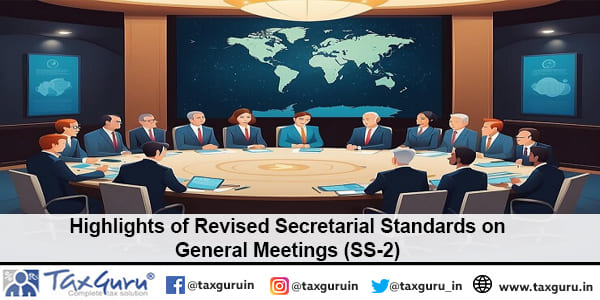According to Section 118 of the Companies Act, 2013 (“Act”), every Company is mandated to conduct its Board and General Meetings pursuant to the provisions of this Section and the Secretarial Standards issued by the Institute of Company Secretaries of India (“ICSI”). Accordingly, ICSI with the approval of the Central Government has issued Secretarial Standards on General Meetings (“SS-2/Standards”) which are effective from July 01st, 2015.
The ICSI in January 2024 has issued a revised SS-2 (effective from April 01st, 2024) to maintain consistency with the amended (vide Companies (Amendment) Act, 2017) provisions of the Act.
Major highlights on Revised SS-2
- One Person Company (OPC) and Section 8 Company are exempted from complying with these Standards. However, Section 8 companies are required to comply with applicable provisions of the Act relating to General Meetings.
The specific exemptions provided under these Standards to Section 8 companies and certain private companies shall only be available if it has not defaulted in filing their Financial Statements or Annual Returns with the Registrar of Companies.
- The provisions relating to the ratification of the Auditor at every Annual General Meeting are done with according to amendment in Section 139 of the Act. Hence, the words “or ratification thereof” are omitted from the definition of ‘Ordinary Business’.
- In case of Unlisted Companies, with prior consent of all the members (either in writing or by electronic means received before the Meeting), its Annual General Meeting may be held at any place in India.

Except, for the wholly owned subsidiary of a Company incorporated outside India, an Extraordinary General Meeting of any company, shall be held at a place within India.
- In case of a Government company, its Annual General Meeting may be held at its registered office or such other place within the city, town or village in which the registered office is situated or such other place as the Central Government, may approve in this behalf.
- An item of business shall be transacted by way of postal ballot only if, the number of members of any company is not less than two hundred. However, the company required to provide an e-voting facility to its members may transact such a business at a duly convened General
- A Resolution passed by postal ballot shall be rescinded only by a resolution passed subsequently by a postal ballot. In case of a company requiring to provide an e-voting facility to its members, it can be rescinded by a resolution passed at a duly convened General Meeting.
Except for a company in which ninety percent or more of its members, in numbers are related parties or relatives of promoters; a member who is a related party shall not be entitled to vote on a resolution pertaining to a contract or arrangement in which he/she is a related party.
- Further, a resolution passed by the holding company shall be sufficient for entering into transactions with the wholly owned subsidiary by its holding company.
- A vote may be cast by a member, being a related party on a Resolution pertaining to approval of any contract or arrangement to be entered into by (a) A Government company with any other Government company or with Central Government or any State Government or any combination thereof; or (b) An unlisted Government company with the prior approval of competent authority, other than those contract or arrangements referred in clause (a).
- If requisite consent of members is accorded, prior to the time fixed for the meeting, by physical or electronic means then the following documents may be provided at a shorter period of time:
| Type of document | Type of meeting | Requisite consent | |
| Notice and accompanying documents | Annual General Meeting | Not less than 95% of the members entitled to vote | |
| Financial Statements and other documents to be annexed thereto | if company has a share capital | members entitled to vote and represent not less than 95% of such part of the paid-up share capital | |
| if company has no share capital | not less than 95% of the total voting power | ||
| Notice and accompanying documents | Other General Meeting | if company has a share capital | members entitled to vote and represent not less than 95% of such part of the paid-up share capital |
| if company has no share capital | not less than 95% of the total voting power | ||
Consent for shorter Notice shall be obtained from such number of Members as specified above, or as stated in Articles, in case of a private company.
The vote of the Member concerning shorter notice shall only be counted for those resolution(s) on which the Member is entitled to vote and not for others.
- Apart from the above, the term “Para” wherever appearing in SS-2 is replaced with the term “Paragraph”, for improvement in the language and appropriate interpretation of the Standard.
Conclusion: The revised Secretarial Standards on General Meetings (SS-2) introduce several significant changes and exemptions to enhance compliance and streamline procedures for companies. By understanding and adhering to these revised standards, companies can ensure smoother conduct of board and general meetings, fostering transparency and accountability in corporate governance.
*****
Disclaimer: This article provides general information existing at the time of preparation and we take no responsibility to update it with the subsequent changes in the law. The article is intended as a news update and Affluence Advisory neither assumes nor accepts any responsibility for any loss arising to any person acting or refraining from acting as a result of any material contained in this article. It is recommended that professional advice be taken based on specific facts and circumstances. This article does not substitute the need to refer to the original pronouncement





